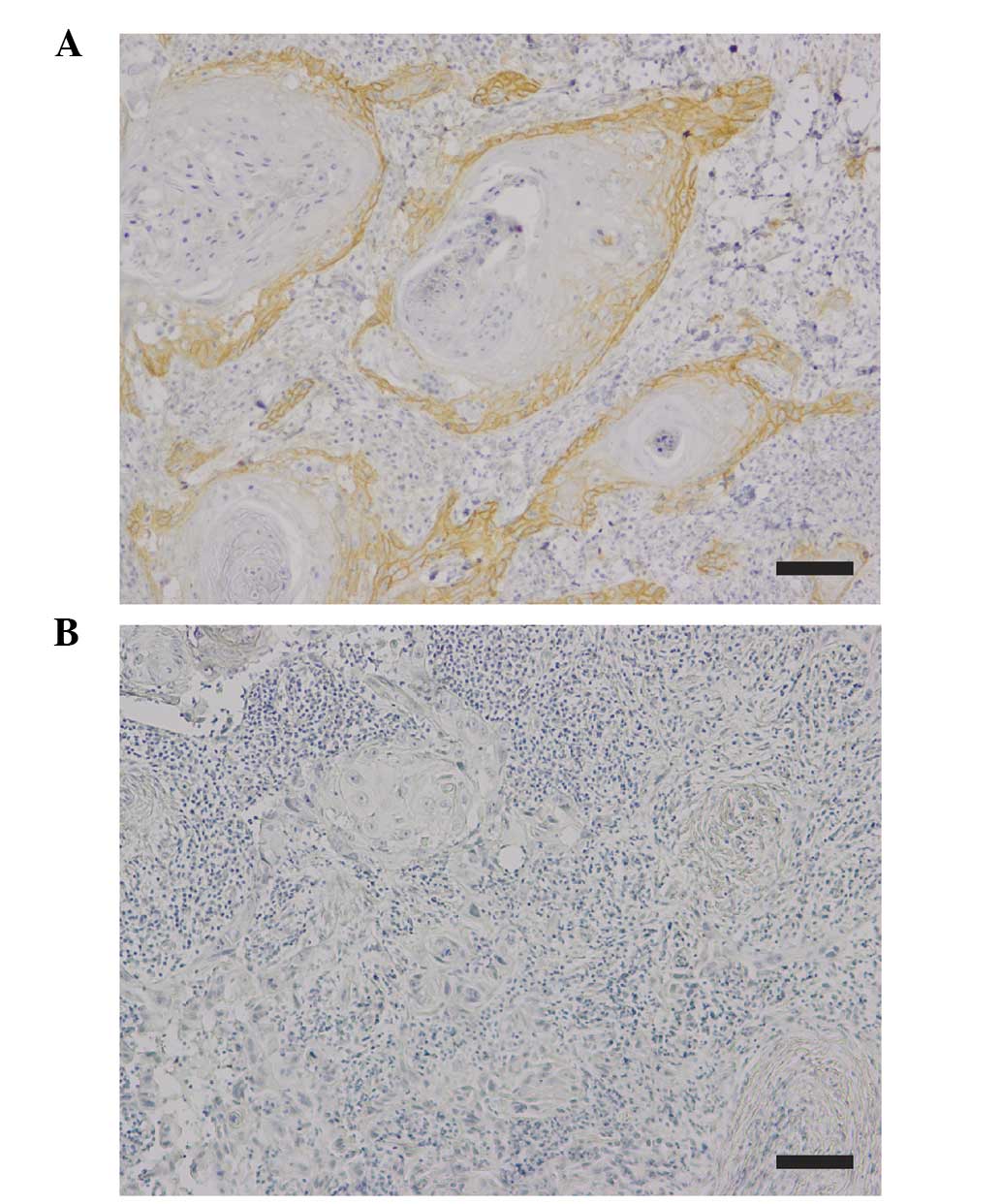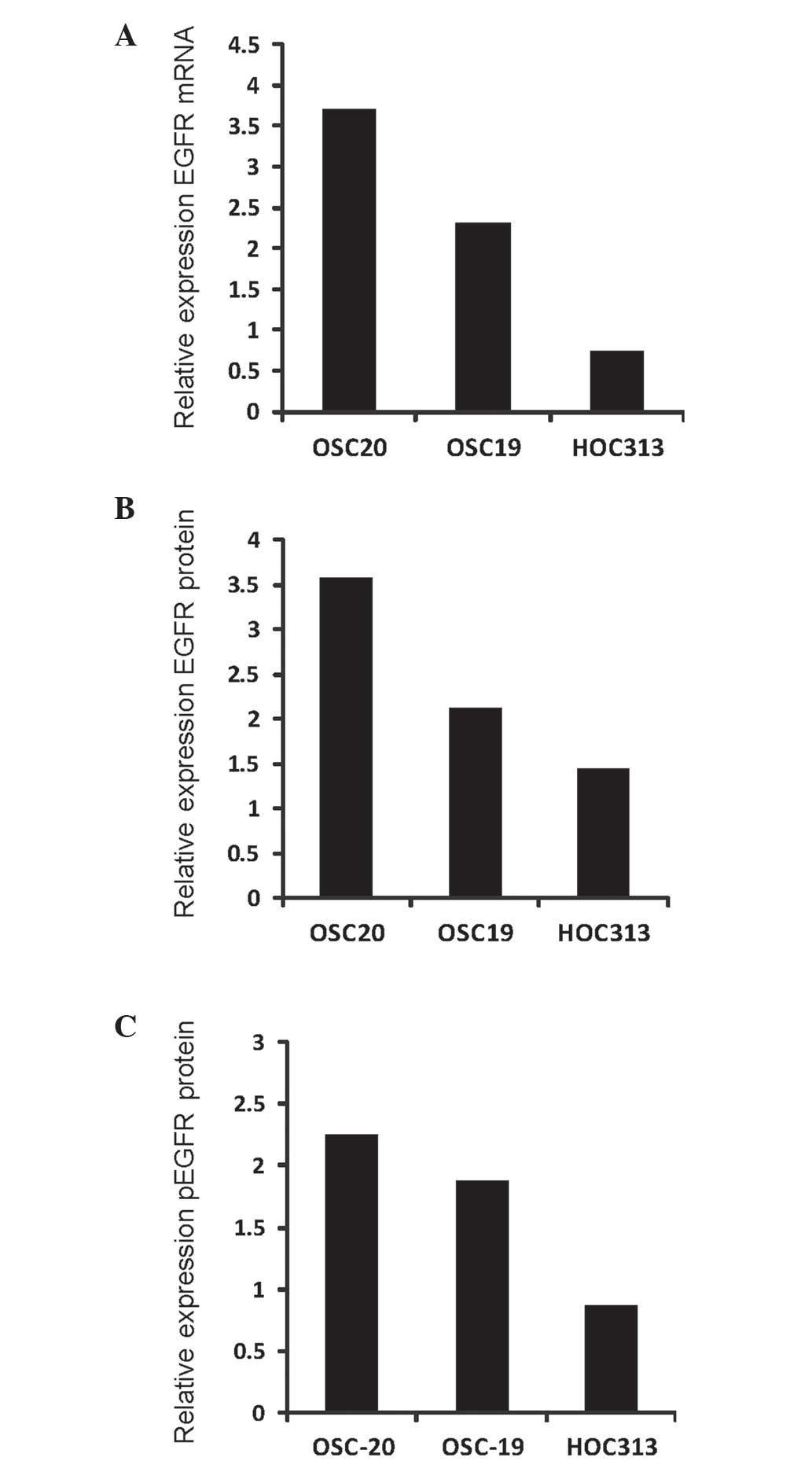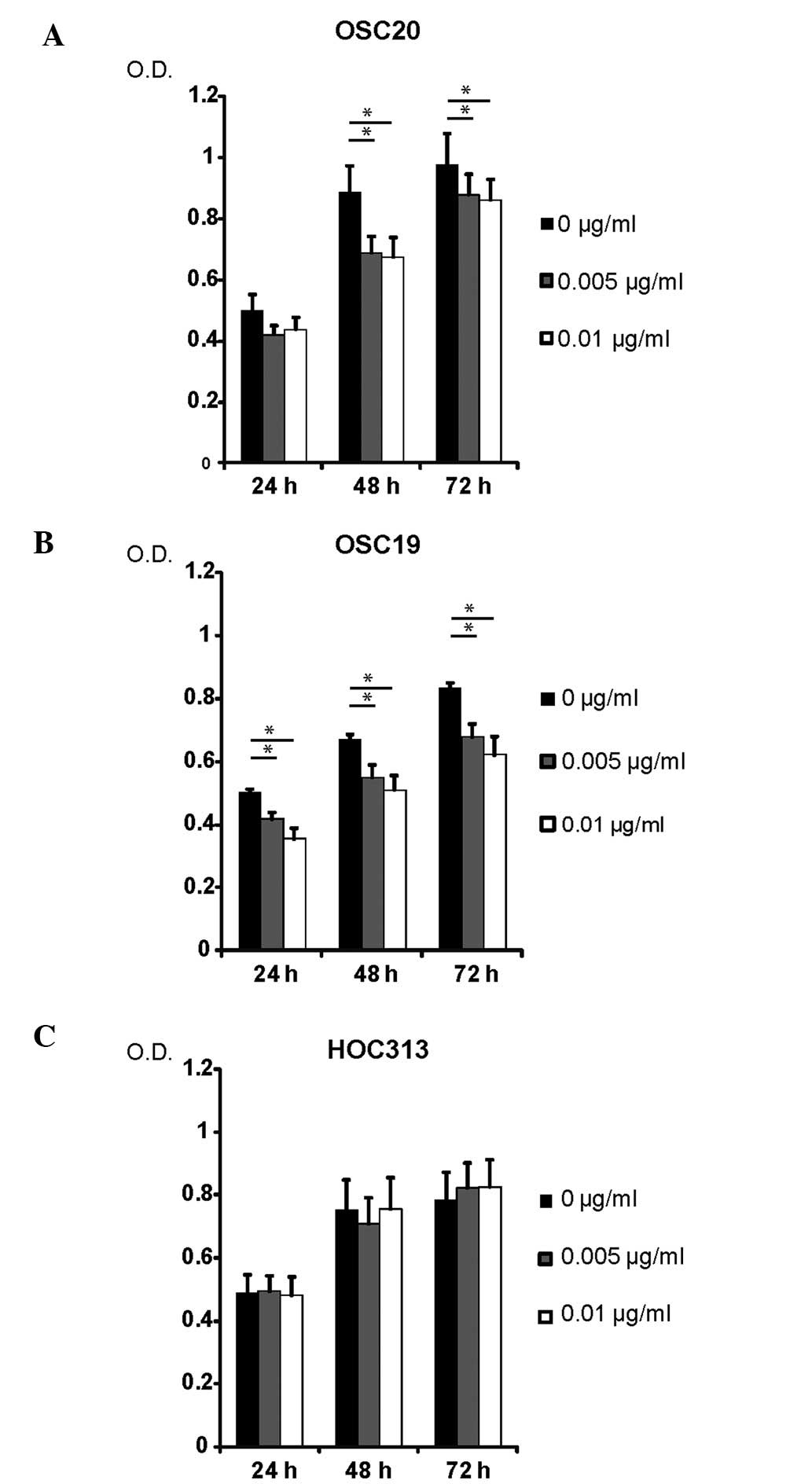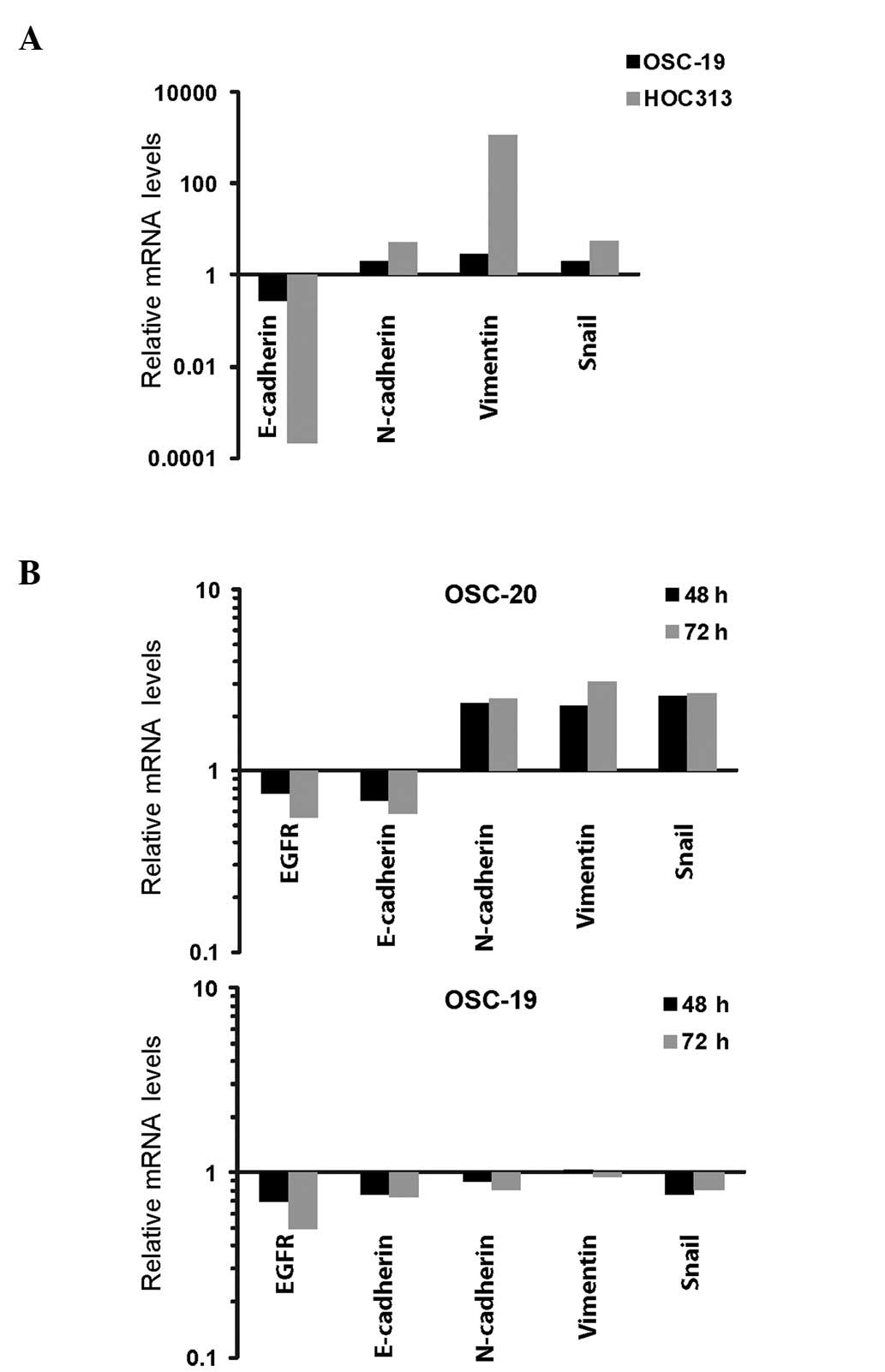|
1
|
Ang KK, Berkey BA, Tu X, Zhang HZ, Katz R,
Hammond EH, Fu KK and Milas L: Impact of epidermal growth factor
receptor expression on survival and pattern of relapse in patients
with advanced head and neck carcinoma. Cancer Res. 62:7350–7356.
2002.PubMed/NCBI
|
|
2
|
Mahipal A, Kothari N and Gupta S:
Epidermal growth factor receptor inhibitors: coming of age. Cancer
Control. 21:74–79. 2014.PubMed/NCBI
|
|
3
|
Loeffler-Ragg J, Schwentner I, Sprinzl GM
and Zwierzina H: EGFR inhibition as a therapy for head and neck
squamous cell carcinoma. Expert Opin Investig Drugs. 17:1517–1531.
2008. View Article : Google Scholar : PubMed/NCBI
|
|
4
|
Bourhis J, Rivera F, Mesia R, Awada A,
Geoffrois L, Borel C, Humblet Y, Lopez-Pousa A, Hitt R, Vega
Villegas ME, et al: Phase I/II study of cetuximab in combination
with cisplatin or carboplatin and fluorouracil in patients with
recurrent or metastatic squamous cell carcinoma of the head and
neck. J Clin Oncol. 24:2866–2872. 2006. View Article : Google Scholar : PubMed/NCBI
|
|
5
|
Burtness B, Goldwasser MA, Flood W, Mattar
B and Forastiere AA: Eastern Cooperative Oncology Group: Phase III
randomized trial of cisplatin plus placebo compared with cisplatin
plus cetuximab in metastatic/recurrent head and neck cancer: An
eastern cooperative oncology group study. J Clin Oncol.
23:8646–8654. 2005. View Article : Google Scholar : PubMed/NCBI
|
|
6
|
Shin DM, Donato NJ, Perez-Soler R, Shin
HJ, Wu JY, Zhang P, Lawhorn K, Khuri FR, Glisson BS, Myers J, et
al: Epidermal growth factor receptor-targeted therapy with C225 and
cisplatin in patients with head and neck cancer. Clin Cancer Res.
7:1204–1213. 2001.PubMed/NCBI
|
|
7
|
Vermorken JB, Mesia R, Rivera F, Remenar
E, Kawecki A, Rottey S, Erfan J, Zabolotnyy D, Kienzer HR, Cupissol
D, et al: Platinum-based chemotherapy plus cetuximab in head and
neck cancer. N Engl J Med. 359:1116–1127. 2008. View Article : Google Scholar : PubMed/NCBI
|
|
8
|
Baselga J, Trigo JM, Bourhis J, et al:
Phase II multicenter study of the antiepidermal growth factor
receptor monoclonal antibody cetuximab in combination with
platinum-based chemotherapy in patients with platinum-refractory
metastatic and/or recurrent squamous cell carcinoma of the head and
neck. J Clin Oncol. 23:5568–5577. 2005. View Article : Google Scholar : PubMed/NCBI
|
|
9
|
Herbst RS, Arquette M, Shin DM, et al:
Phase II multicenter study of the epidermal growth factor receptor
antibody cetuximab and cisplatin for recurrent and refractory
squamous cell carcinoma of the head and neck. J Clin Oncol.
23:5578–5587. 2005. View Article : Google Scholar : PubMed/NCBI
|
|
10
|
Vermorken JB, Trigo J, Hitt R, et al:
Open-label, uncontrolled, multicenter phase II study to evaluate
the efficacy and toxicity of cetuximab as a single agent in
patients with recurrent and/or metastatic squamous cell carcinoma
of the head and neck who failed to respond to platinum-based
therapy. J Clin Oncol. 25:2171–2177. 2007. View Article : Google Scholar : PubMed/NCBI
|
|
11
|
O-charoenrat P, Rhys-Evans PH, Archer DJ
and Eccles SA: C-erbB receptors in squamous cell carcinomas of the
head and neck: Clinical significance and correlation with matrix
metalloproteinases and vascular endothelial growth factors. Oral
Oncol. 38:73–80. 2002. View Article : Google Scholar : PubMed/NCBI
|
|
12
|
O-charoenrat P, Rhys-Evans PH, Modjtahedi
H and Eccles SA: The role of c-erbB receptors and ligands in head
and neck squamous cell carcinoma. Oral Oncol. 38:627–640. 2002.
|
|
13
|
Sarkis SA, Abdullah BH, Abdul Majeed BA
and Talabani NG: Immunohistochemical expression of epidermal growth
factor receptor (EGFR) in oral squamous cell carcinoma in relation
to proliferation, apoptosis, angiogenesis and lymphangiogenesis.
Head Neck Oncol. 2:132010. View Article : Google Scholar : PubMed/NCBI
|
|
14
|
Ryott M, Wangsa D, Heselmeyer-Haddad K,
Lindholm J, Elmberger G, Auer G, Avall Lundqvist E, Ried T and
Munck-Wikland E: EGFR protein overexpression and gene copy number
increases in oral tongue squamous cell carcinoma. Eur J Cancer.
45:1700–1708. 2009. View Article : Google Scholar : PubMed/NCBI
|
|
15
|
Bonner JA, Harari PM, Giralt J, Azarnia N,
Shin DM, Cohen RB, Jones CU, Sur R, Raben D, Jassem J, et al:
Radiotherapy plus cetuximab for squamous-cell carcinoma of the head
and neck. N Engl J Med. 354:567–578. 2006. View Article : Google Scholar : PubMed/NCBI
|
|
16
|
Lynch TJ, Bell DW, Sordella R,
Gurubhagavatula S, Okimoto RA, Brannigan BW, Harris PL, Haserlat
SM, Supko JG, Haluska FG, et al: Activating mutations in the
epidermal growth factor receptor underlying responsiveness of
non-small-cell lung cancer to gefitinib. N Engl J Med.
350:2129–2139. 2004. View Article : Google Scholar : PubMed/NCBI
|
|
17
|
Paez JG, Jänne PA, Lee JC, Tracy S,
Greulich H, Gabriel S, Herman P, Kaye FJ, Lindeman N, Boggon TJ, et
al: EGFR mutations in lung cancer: Correlation with clinical
response to gefitinib therapy. Science. 304:1497–1500. 2004.
View Article : Google Scholar : PubMed/NCBI
|
|
18
|
Lemos-González Y, de la Páez Cadena M,
Rodríguez-Berrocal FJ, Rodríguez-Piñeiro AM, Pallas E and Valverde
D: Absence of activating mutations in the EGFR kinase domain in
Spanish head and neck cancer patients. Tumour Biol. 28:273–279.
2007. View Article : Google Scholar : PubMed/NCBI
|
|
19
|
Nantajit D, Lin D and Li JJ: The network
of epithelial-mesenchymal transition: Potential new targets for
tumor resistance. J Cancer Res Clin Oncol. 141:1697–1713. 2015.
View Article : Google Scholar : PubMed/NCBI
|
|
20
|
Banyard J and Bielenberg DR: The role of
EMT and MET in cancer dissemination. Connect Tissue Res. 1–11.
2015.
|
|
21
|
Hsu DS, Lan HY, Huang CH, Tai SK, Chang
SY, Tsai TL, Chang CC, Tzeng CH, Wu KJ, Kao JY and Yang MH:
Regulation of excision repair cross-complementation group 1 by
Snail contributes to cisplatin resistance in head and neck cancer.
Clin Cancer Res. 16:4561–4571. 2010. View Article : Google Scholar : PubMed/NCBI
|
|
22
|
Skvortsova I, Skvortsov S, Raju U, Stasyk
T, Riesterer O, Schottdorf EM, Popper BA, Schiestl B, Eichberger P,
Debbage P, et al: Epithelial-to-mesenchymal transition and c-myc
expression are the determinants of cetuximab-induced enhancement of
squamous cell carcinoma radioresponse. Radiother Oncol. 96:108–115.
2010. View Article : Google Scholar : PubMed/NCBI
|
|
23
|
Greene FL and Sobin LH: A worldwide
approach to the TNM staging system: collaborative efforts of the
AJCC and UICC. J Surg Oncol. 99:269–272. 2009. View Article : Google Scholar : PubMed/NCBI
|
|
24
|
Thompson L: World Health Organization
classification of tumours: pathology and genetics of head and neck
tumours. Ear Nose Throat J. 85:742006.PubMed/NCBI
|
|
25
|
Yamamoto E, Kohama G, Sunakawa H, Iwai M
and Hiratsuka H: Mode of invasion, bleomycin sensitivity and
clinical course in squamous cell carcinoma of the oral cavity.
Cancer. 51:2175–2180. 1983. View Article : Google Scholar : PubMed/NCBI
|
|
26
|
Bernardes VF, Gleber-Netto FO, Sousa SF,
Silva TA and Aguiar MC: Clinical significance of EGFR, Her-2 and
EGF in oral squamous cell carcinoma: A case control study. J Exp
Clin Cancer Res. 29:402010. View Article : Google Scholar : PubMed/NCBI
|
|
27
|
Yokoi T, Hirata S, Nishimura F, Miyakawa
A, Odajima T and Kohama G: Some properties of a newly established
human cell line derived from an oral squamous carcinoma. Tumor Res.
25:93–103. 1990.
|
|
28
|
Yokoi T, Homma H and Odajima T:
Establishment and characterization of OSC-19 cell line in serum-
and protein-free culture. Tumor Res. 24:1–17. 1988.
|
|
29
|
Ishisaki A, Oida S, Momose F, Amagasa T,
Rikimaru K, Ichijo H and Sasaki S: Identification and
characterization of autocrine-motility-factor-like activity in oral
squamous-cell-carcinoma cells. Int J Cancer. 59:783–788. 1994.
View Article : Google Scholar : PubMed/NCBI
|
|
30
|
Oliveira S, van Bergen en Henegouwen PM,
Storm G and Schiffelers RM: Molecular biology of epidermal growth
factor receptor inhibition for cancer therapy. Expert Opin Biol
Ther. 6:605–617. 2006. View Article : Google Scholar : PubMed/NCBI
|
|
31
|
Pernas FG, Allen CT, Winters ME, Yan B,
Friedman J, Dabir B, Saigal K, Mundinger GS, Xu X, Morris JC, et
al: Proteomic signatures of epidermal growth factor receptor and
survival signal pathways correspond to gefitinib sensitivity in
head and neck cancer. Clin Cancer Res. 15:2361–2372. 2009.
View Article : Google Scholar : PubMed/NCBI
|
|
32
|
Hamakawa H, Nakashiro K, Sumida T,
Shintani S, Myers JN, Takes RP, Rinaldo A and Ferlito A: Basic
evidence of molecular targeted therapy for oral cancer and salivary
gland cancer. Head Neck. 30:800–809. 2008. View Article : Google Scholar : PubMed/NCBI
|
|
33
|
Yauch RL, Januario T, Eberhard DA, Cavet
G, Zhu W, Fu L, Pham TQ, Soriano R, Stinson J, Seshagiri S, et al:
Epithelial versus mesenchymal phenotype determines in vitro
sensitivity and predicts clinical activity of erlotinib in lung
cancer patients. Clin Cancer Res. 11:8686–8698. 2005. View Article : Google Scholar : PubMed/NCBI
|
|
34
|
Thomson S, Petti F, Sujka-Kwok I, Epstein
D and Haley JD: Kinase switching in mesenchymal-like non-small cell
lung cancer lines contributes to EGFR inhibitor resistance through
pathway redundancy. Clin Exp Metastasis. 25:843–854. 2008.
View Article : Google Scholar : PubMed/NCBI
|
|
35
|
Thomson S, Buck E, Petti F, Griffin G,
Brown E, Ramnarine N, Iwata KK, Gibson N and Haley JD: Epithelial
to mesenchymal transition is a determinant of sensitivity of
non-small-cell lung carcinoma cell lines and xenografts to
epidermal growth factor receptor inhibition. Cancer Res.
65:9455–9462. 2005. View Article : Google Scholar : PubMed/NCBI
|
|
36
|
Adam L, Zhong M, Choi W, Qi W, Nicoloso M,
Arora A, Calin G, Wang H, Siefker-Radtke A, McConkey D, et al:
miR-200 expression regulates epithelial-to-mesenchymal transition
in bladder cancer cells and reverses resistance to epidermal growth
factor receptor therapy. Clin Cancer Res. 15:5060–5072. 2009.
View Article : Google Scholar : PubMed/NCBI
|
|
37
|
Barr S, Thomson S, Buck E, Russo S, Petti
F, Sujka-Kwok I, Eyzaguirre A, Rosenfeld-Franklin M, Gibson NW,
Miglarese M, et al: Bypassing cellular EGF receptor dependence
through epithelial-to-mesenchymal-like transitions. Clin Exp
Metastasis. 25:685–693. 2008. View Article : Google Scholar : PubMed/NCBI
|


















